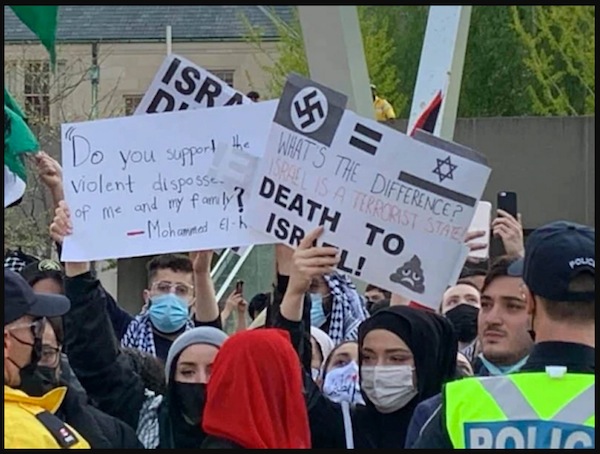The following remarks were delivered at the Israel hostages rally at Vancouver Art Gallery on Sept. 15, which is also the International Day of Democracy.
In recognition of the International Day of Democracy, I will talk about how antisemitism is harming and potentially destroying democracy. This talk will be based mainly on a report by Amy Spitalnick, just published in the United States. Fair warning, this talk will be heavy, but, in my view, important to understand.
Antisemitism is a form of religious, racial and ethnic prejudice against Jews. But, unlike other such prejudices, antisemitism also operates as a conspiracy theory that lies about Jewish power and influence. And, because it functions as a conspiracy theory, antisemitism poses a threat far beyond the Jewish community. It fuels other forms of hate and extremism, including against other communities and against democratic institutions that are depicted as pawns of Jewish control.
Antisemitism – like other conspiracy theories – increases at times of social or political anxiety, as people look for a source to blame for what’s wrong with society and with their lives.
Enemies of democracy, such as Iran and Russia, use antisemitism to undermine trust in democracies and make them seem like failed states. The “conspiracy myth” that Jews control certain sectors of society, such as banks, media or elections, is the cornerstone of antisemitism, and anyone who accepts this myth loses faith in democracy. If Jews control elections, judges and finance, people say to themselves, how can I, as a non-Jew, live up to my potential? My failings are caused by evil forces beyond my control.
Casting Jews as all-powerful naturally fuels hatred of Jews. But it also explains what extremists believe – that other communities, like People of Colour, non-Christians, LGBTQ+, are incapable of success except through unfair or illegal ways. And so, belief in this powerful Jewish control group causes distrust in democratic institutions and values.
When neo-Nazis came to Charlottesville, Va., in 2017, they chanted “Jews will not replace us,” showing that they believed in the “Great Replacement” conspiracy theory. Once hidden in the dark corners of the internet, this conspiracy theory says that there is a deliberate Jewish effort to replace the white population with immigrants and People of Colour. This conspiracy theory has directly inspired many mass killings targeting not only Jewish people (Pittsburgh and Poway), but also Hispanic people (El Paso), Black people (Buffalo), Muslims (New Zealand and London, Ont.) and other communities.
Versions of this conspiracy theory have become increasingly mainstreamed, courtesy of influencers, elected officials, candidates and foreign powers in our social media. They use it to advance their own political goals – and, at the same time, they embolden violent extremists. In the Jan. 6, 2021, attack on the US Congress, when many insurrectionists carried white supremacist symbols in their efforts to overturn the 2020 US election results, they included false claims of undocumented immigrants stealing the election. Only recently, we heard in the presidential debate about immigrants eating their neighbours’ pets from a man who wants to be president.
Recent polling shows that belief in conspiracy theories is among the best predictors of antisemitism. And a recent US survey found that highly antisemitic Americans are significantly more likely to support political violence and other forms of anti-democratic extremism. So, what to do?
First of all, we need to fight like hell! We need to call out conspiracy theories against Jews and any other identifiable group every time we encounter them. We need to educate ourselves about what antisemitism means by knowing the International Holocaust Remembrance Alliance definition and its examples, and we must call out antisemitism and other forms or racism when we see it.
We should fight against antisemitism but also against all other forms of racism, including Islamophobia, misogyny, sexual-preference bigotry and other forms of hate and violence; and we should work to advance inclusive, multi-ethnic democracy. The safety and fates of all minority communities and, eventually, all supporters of democracy, are bound together. Jews historically thrive in free, democratic states, and don’t do so well in autocracies, even if autocratic rule might at first seem attractive.
I know this won’t be easy. Many Jews, including me, have felt abandoned and isolated by those who have remained conspicuously silent, or worse, fallen for anti-Israel and antisemitic lies. This crisis since Oct. 7 exposed the lack of understanding of antisemitism in so many parts of society, including how antisemitism is present in conversations related to Israel. Fundamentally, there is a lack of recognition that Jewish safety, including in Israel, is deeply linked to the safety of all communities in all democracies. We need to change that.
But, while we need to work tirelessly to save ourselves and combat antisemitism, we alone, without allies, cannot stop antisemitism. We need to recognize that antisemitism is one part, granted a big part, of the assault on democracy that affects everyone.
If we accept what we need to do as I’ve outlined today, it means having open and difficult conversations with others who think they can save democracy without fighting antisemitism. We need to show them that they are wrong. Let’s start today.
Bernard Pinsky, KC, is chair of the Ronald S. Roadburg Foundation.

